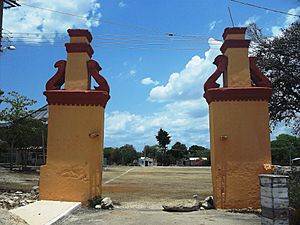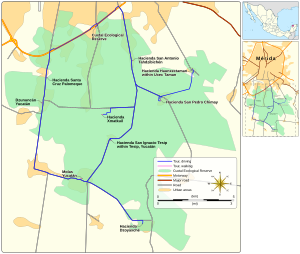Hacienda Hunxectamán facts for kids
Quick facts for kids
Hacienda Hunxectamán
|
|
|---|---|
|
Private Event Venue
|
|

Entrance Hacienda Hunxectamán, Yucatán.
|
|
 |
|
| Country | Mexico |
| Mexican States | Yucatán |
| Municipalities | Mérida Municipality |
| Time zone | UTC−6 (CST) |
| • Summer (DST) | UTC−5 (CDT) |
| Postal code |
97316
|
| Area code | 999 |
Hacienda Hunxectamán is a historic estate located in the Mérida Municipality in Yucatán, a state in southeastern Mexico. It was one of many large properties that grew important during the 1800s. This was a time when a plant called henequen was very valuable. Today, Hacienda Hunxectamán is part of the Cuxtal Ecological Reserve. This special reserve was created in 1993 to protect both the historical buildings and the natural environment around Mérida.
Contents
What's in a Name?
The name "Hunxectamán" comes from the Mayan language spoken in Yucatán. You might also see it spelled as Hunxactaman or Uxec Taman. The name is made up of three Mayan words:
- "Hun" means one.
- "Xec" means group.
- "Taman" means sheep (like a ram or a lamb).
So, the name means something like "one group of sheep."
Finding Hunxectamán
This hacienda is located about 11 kilometers (about 7 miles) south of Mérida. You can find it on Calle 77.
A Look at History
Haciendas were large estates in Mexico, often used for farming or ranching. Many in Yucatán, like Hunxectamán, focused on growing henequen. This plant was used to make strong fibers for ropes and other products.
The Cuxtal Ecological Reserve
On June 28, 1993, the Cuxtal Ecological Reserve was created. Its main goal is to protect the rich history and nature of the area. This reserve includes seven large haciendas, along with their nearby villages. It also protects 12 smaller archaeological sites, 6 natural sinkholes called cenotes, and an important water source for Mérida. Hacienda Hunxectamán is a key part of this protected area.
Other Haciendas in the Reserve
Within the Cuxtal Ecological Reserve, you can find several other historic haciendas:
- Hacienda Hunxectamán in the village of Uxec Taman
- Hacienda San Antonio Tahdzibichén
- Hacienda San Ignacio Tesip in the village of Tesip
- Hacienda San Nicolás Dzoyaxché, which has a cenote called Dzonot-Ich on its land
- Hacienda San Pedro Chimay
- Hacienda Santa Cruz Palomeque
- Hacienda Xmatkuil
People of Hunxectamán
Before 1937, many people lived and worked directly on the henequen haciendas. However, things changed a lot with a land reform program. This program was started by President Lazaro Cardenas in 1937. His new rules turned many haciendas into collective ejidos. This meant that the land was given to local communities to manage together.
After this change, the former landowners could only keep about 150 hectares (about 370 acres) for their private use. This meant that fewer people lived directly on the hacienda itself. The population figures changed to reflect those living in the nearby community, rather than just on the farm.
For example, in 1900, about 114 people lived at Hunxectamán. By 1950, this number had dropped to 39. Later, in 2005, a census by the INEGI counted 104 people living in the community connected to the hacienda.
Photo gallery
See also
 In Spanish: Hunxectamán (Mérida) para niños
In Spanish: Hunxectamán (Mérida) para niños








